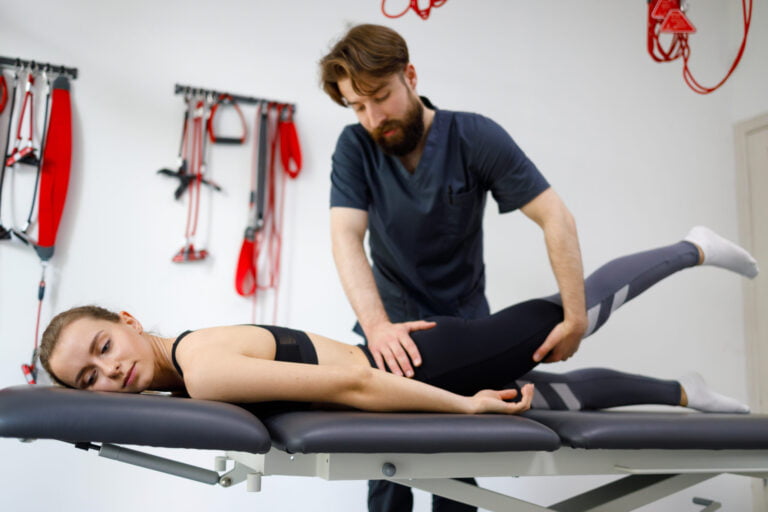Technology has a crucial impact on many aspects of people’s lives. Electronic equipment and digital devices play a significant role in personal and professional communication, recreational or educational activities, and business decisions. Technological advances such as the Internet, personal computers, mobile phones, artificial intelligence (AI), and more, continually receive upgrades and their widespread use and accessibility are growing every day.
Advances in technology contribute to several industries, including, but not limited to, education, small business functions, large business operations, the space industry, the travel industry, and the healthcare industry. The creation of healthcare technology has been essential to the medical sector; optimizing and increasing the efficiency of practicing medicine.

Examples of healthcare technology include magnetic resonance imaging (MRI) machines, computed tomography (CT) scan machines, robotic prosthetic limbs, artificial organs, devices used to perform screening, testing, and assessments, and products designed to make caring for medical conditions and issues, such as diabetes, asthma, high blood pressure, and deep vein thrombosis (DVT)—commonly known as blood clots—easier.
Medical screenings, telehealth options, electronic equipment, robotics, and more are some of many new-age inventions and solutions that are trends in healthcare.
Medical Screenings and Telehealth
According to statistical data reported by the Centers for Disease Control and Prevention (CDC), approximately 84 percent of adults and nearly 94 percent of children in the United States had contact with a healthcare professional in 2018. Visiting a healthcare professional enables people to receive routine and periodic health examinations for their heart, lungs, teeth, eyes, and ears, and screenings for conditions like high blood pressure, heart disease, diabetes, and cancers. Such tests and screenings can help prevent and reduce disability and illness.
An audiology test is one of the most important medical tests a person can receive. Having your ears checked often can help improve your quality of life. A thorough evaluation of your hearing health and an in-depth hearing test allows audiology professionals to determine what solutions you’ll need to enhance your hearing health, give the proper diagnosis of any hearing condition, and provide treatment for hearing loss or other conditions.
Consider visiting clinics and speaking to licensed hearing health professionals who specialize in audiology. Having a personalized consultation following a comprehensive hearing test is best.
Advances in healthcare technology enable audiology specialists to perform several kinds of thorough audiological tests, including an otoscopy, a pressure test, and a hearing test. Robust technology and remote connectivity tools even allow hearing professionals to communicate and conduct hearing assessments via the Internet.
Using the Internet and telecommunication technologies to distribute health services and information is a distribution process referred to as telehealth. Telehealth allows patients and clinicians to connect over a long-distance and provide care, intervention, education, monitoring, and more. A similar process is telemedicine, which enables physicians to execute clinical services such as diagnosis remotely.
This hearing-related telehealth and telemedicinal option can be beneficial and convenient, especially now amid the novel coronavirus (COVID-19) pandemic that requires people to maintain physical distance or stay home as a necessity to slow and stop the virus’ spread.
Technology-driven Research
Electronic engineering can result in the production of scientific and laboratory medical devices designed and manufactured for professional use. As a result, the technology enables scientists to conduct the necessary research. Engineering in the area of healthcare technology leads to the manufacturing of tools and instruments, that laboratory researchers can then use for testing, measuring, and analyzing.
The right tools can empower researchers to work hard, seeking solutions and treatments for some of the most complicated medical conditions. Such research can result in the development of treatments such as gimsilumab, which is intended to treat and prevent acute respiratory distress syndrome (ARDS) experienced by patients with COVID-19. ARDS is a severe COVID-19 complication that calls for life support measures such as hospitalization and mechanical ventilation.
The subject of a clinical trial by Kinevant—a Roivant Sciences subsidiary—gimsilumab is an investigational, completely human monoclonal antibody that targets granulocyte-macrophage colony-stimulating factor (GM-CSF). Researchers believe GM-CSF is a master regulator of cytokine dysregulation and myeloid cell lung infiltration, which results in respiratory failure in severe COVID-19 patients. The researchers leading Kinevant’s gimsilumab program are world-class experts in GM-CSF immunobiology, clinical development, and COVID-19 disease management.
Likewise, world-renowned physicians volunteer to work together with researchers and patients to support myocarditis research. Myocarditis is a medical condition characterized by the inflammation of the myocardium—the thick, muscular middle layer of the heart. The myocardium makes up a significant portion of the wall of the heart. This muscle has the essential responsibility of contracting and relaxing with heartbeats, pumping blood in and out of this vital organ, and the rest of the body. When the myocardium experiences inflammation, it becomes less effective at its ability to pump blood, leading to problems such as chest pains, an abnormal heartbeat, or difficulty breathing. Severe inflammation can result in blood clots that can lead to a stroke or heart attack, heart failure, and other potentially fatal conditions.
The exact causes of myocarditis are unknown in many cases, but a common contributor to this health condition is an infection that traveled to the heart muscle. Usually, it’s a viral infection, but it could also be bacterial, parasitic, or fungal. In such cases, the immune system tries to fight back and get rid of the disease as the condition attempts to take hold. This process can result in an inflammatory response that may cause a weakening of heart muscle tissue. Certain autoimmune diseases, such as lupus, can cause the immune system to work against the heart, causing inflammation and myocardial damage.
The dedicated efforts of volunteer physicians, researchers, and patients led to the founding of the Myocarditis Foundation, which spreads awareness and information about myocarditis, pericarditis, giant cell myocarditis, and other related conditions. Through supporting and funding heart disease research, these dedicated individuals aim to help the medical industry develop fast, accurate methods for diagnosing myocarditis. In addition, they aim to create more effective treatments and therapies for myocarditis, that successfully prevent myocarditis progression.
Robotics and Medical Devices
Research and electrical engineering make high-quality medical devices, mobile devices, and consumer electronics available to patients. Through research in specific domains such as robotics and exoskeleton technology, EksoBionics—a robotic exoskeleton manufacturing company—can manufacture technologies that enable and empower patients with paralysis to stand and walk, boost worker capabilities globally, and continue research that can support U.S. defense capabilities.
Advanced robotics is a form of healthcare technology that can strengthen human motion by boosting strength, mobility, and endurance across medical and industrial applications. Such technologies can improve the quality of life of patients who experienced illness, disease, or injury, and are now receiving highly specialized medical care from Casa Colina rehabilitation.
New-age trends in healthcare technology continue to evolve with each new success in this domain. Healthcare technology can be robust enough to enhance the way physicians diagnose their patients’ medical conditions, communicate with their patients and colleagues, conduct surgical procedures, and provide treatment for their patients. Improved and increased healthcare technology options continue to encourage the boosting of the quality of the care that patients receive, and therefore, the quality of life that they experience.






